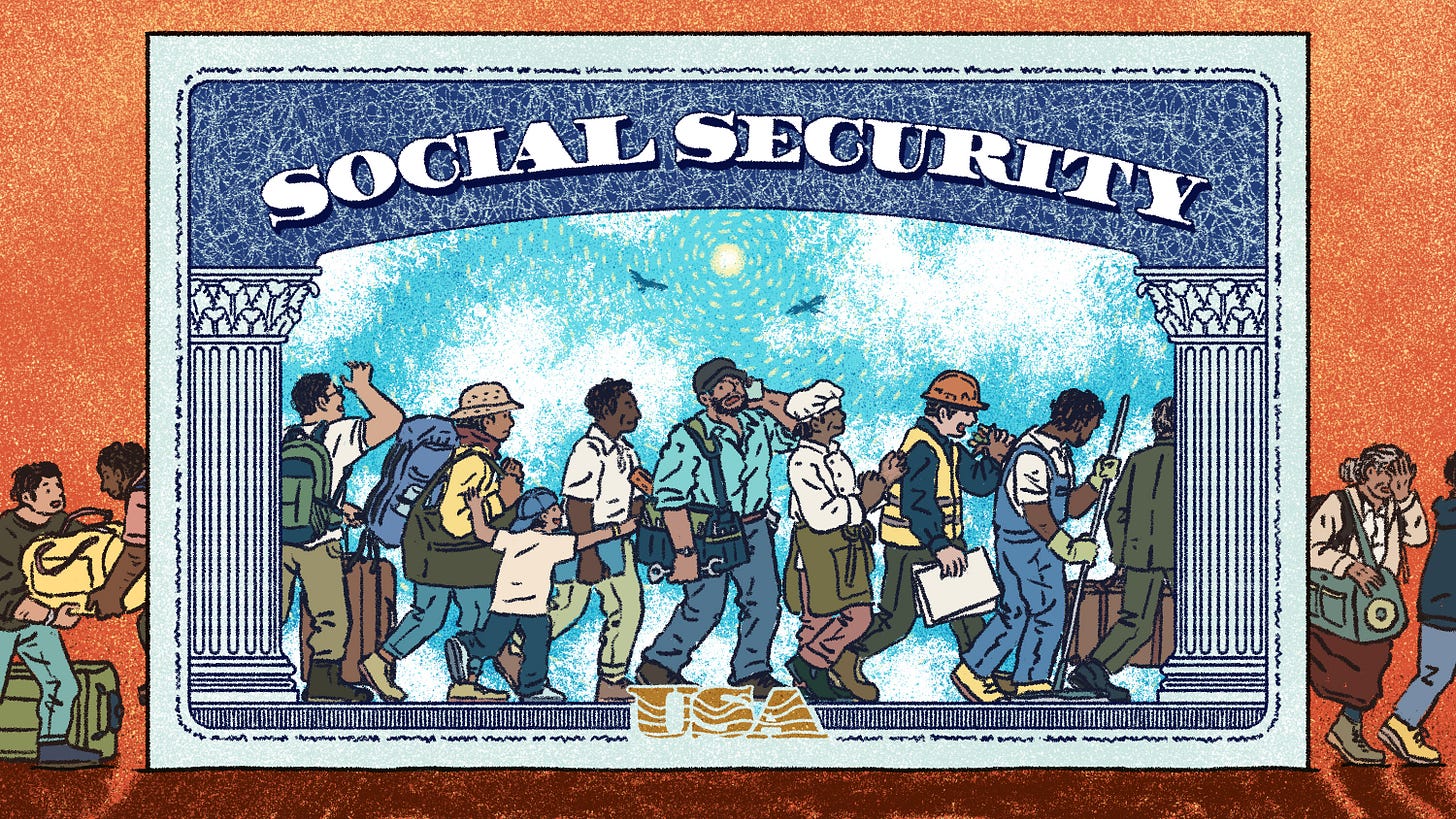How Social Security Became a Tool for Migrant Support
A whistleblower’s revelation about federal directives to qualify illegal migrants for long-term Social Security disability benefits exposes an unsettling dynamic within the American welfare system. The claim is straightforward but staggering: staff assisting newly arrived migrants were explicitly instructed to help them qualify for permanent disability benefits, ensuring they would receive financial support from the government for life.
To the untrained eye, this might seem merely a bureaucratic oversight—an extension of welfare programs aimed at humanitarian aid. However, the implications are profound. If the whistleblower’s account is accurate, what we are witnessing is not mere administrative generosity but the intentional creation of a new class of state-dependent individuals, a strategy that not only drains American resources but permanently alters the socio-political landscape.
The Structure of the Scheme
The whistleblower recounts a training session in which federal employees were told to guide migrants through the process of claiming ailments that would qualify them for Social Security Disability Insurance (SSDI). The ailments mentioned—headaches, lower back pain, stress—are not easily verifiable, yet they serve as legal gateways into a system designed to provide assistance only for those incapable of work. More disturbingly, the first step in this process was to secure Social Security numbers for the migrants, granting them a formalized presence in the system.
One cannot overstate the significance of this maneuver. SSDI is not a short-term stopgap; it is a lifetime entitlement, one that transforms recipients from economic participants into permanent dependents of the state. The whistleblower’s testimony suggests that the program is being deliberately manipulated to place non-citizens on indefinite government support, an act that goes beyond mere financial mismanagement and ventures into the realm of political engineering.
The Politics of Welfare Expansion
Government programs do not exist in a vacuum; they are shaped by political will. Those who advocate for increased welfare benefits often do so under the auspices of compassion and equity. Yet, as history demonstrates, the expansion of government dependency is often a strategic move rather than an unintended consequence.
Consider the 1990s, when the Social Security Administration (SSA) uncovered fraudulent disability claims tied to middlemen who coached immigrants on how to feign disabilities. Congressional hearings revealed that thousands of non-citizens had been improperly placed on SSDI through fabricated medical claims, prompting a brief moment of reform. The result was the 1996 Welfare Reform Act, which sought to limit non-citizens’ access to federal benefits. However, as political tides shifted, those reforms eroded, and today we find ourselves witnessing the reemergence of similar schemes, albeit on a more sophisticated scale.
The Economic Implications of a Welfare State
The issue is not merely one of fraud but of systemic exploitation of America’s economic framework. SSDI was designed to assist those who could no longer work due to genuine disabilities, not as a vehicle for social engineering. The moment disability benefits are treated as a guaranteed income rather than a safety net, they cease to function as intended.
Consider the numbers: The Social Security Administration estimates that lifetime SSDI payments for an individual can exceed $500,000 when factoring in associated medical and support costs. If tens of thousands of migrants are being funneled into this system under dubious pretenses, the financial burden on American taxpayers becomes untenable. A system designed to assist the most vulnerable is now being used as a backdoor for indefinite welfare expansion, with no regard for fiscal sustainability.
The Long-Term Consequences
Beyond the immediate financial strain, there are broader implications for American economic and political stability. History has shown that welfare expansion often correlates with shifts in political allegiance. A populace reliant on government support is less inclined to advocate for policies that reduce state intervention, ensuring a steady voting bloc for those who champion expanded social programs.
Moreover, this strategy subtly undermines the American ethos of self-reliance and work ethic. If new arrivals are taught from the outset that permanent dependency is not only possible but encouraged, it erodes the foundational values that sustain a functioning republic. The result is not merely economic decline but a fundamental shift in the nation’s character.
The Need for Reform
The whistleblower’s account demands a serious legislative and administrative response. If federal agencies are indeed directing employees to facilitate SSDI claims for illegal migrants, the matter must be investigated at the highest levels.
Congress has a duty to ensure that Social Security remains a targeted support system rather than a tool for political manipulation. Legislative action should include:
Strict enforcement of SSDI eligibility requirements, ensuring that only those with genuine, medically verifiable disabilities receive benefits.
Oversight of agencies involved in benefit distribution, holding accountable those who encourage or participate in fraudulent claims.
Immigration policy reforms that prevent government programs from becoming incentives for illegal entry.
Furthermore, this situation makes it crystal clear that Elon Musk’s Department of Government Efficiency (DOGE) must clean house. Democrat activists, masquerading as career civil servants, have perverted our laws and social safety nets to serve their political agenda of open borders. These entrenched bureaucrats are not neutral actors; they are partisans embedded in the system, actively working to reshape American policy through administrative fiat. If Musk’s mission is truly to bring efficiency and accountability to government, dismantling this corrupt framework must be a top priority.
America faces a stark choice: continue on the path of unchecked welfare expansion, or reaffirm the principles of fiscal responsibility, self-reliance, and limited government. The first step is recognizing the problem. The next is ensuring that those who created it are held to account.
The whistleblower’s testimony, if accurate, reveals a coordinated effort to reshape America’s welfare state in ways that go beyond humanitarian aid. It suggests a deliberate strategy to increase government dependency at the cost of fiscal responsibility and national stability. This is not a trivial bureaucratic failure; it is a defining issue of national survival.
If you don't already please follow @amuse on 𝕏 and subscribe to the Deep Dive podcast.



